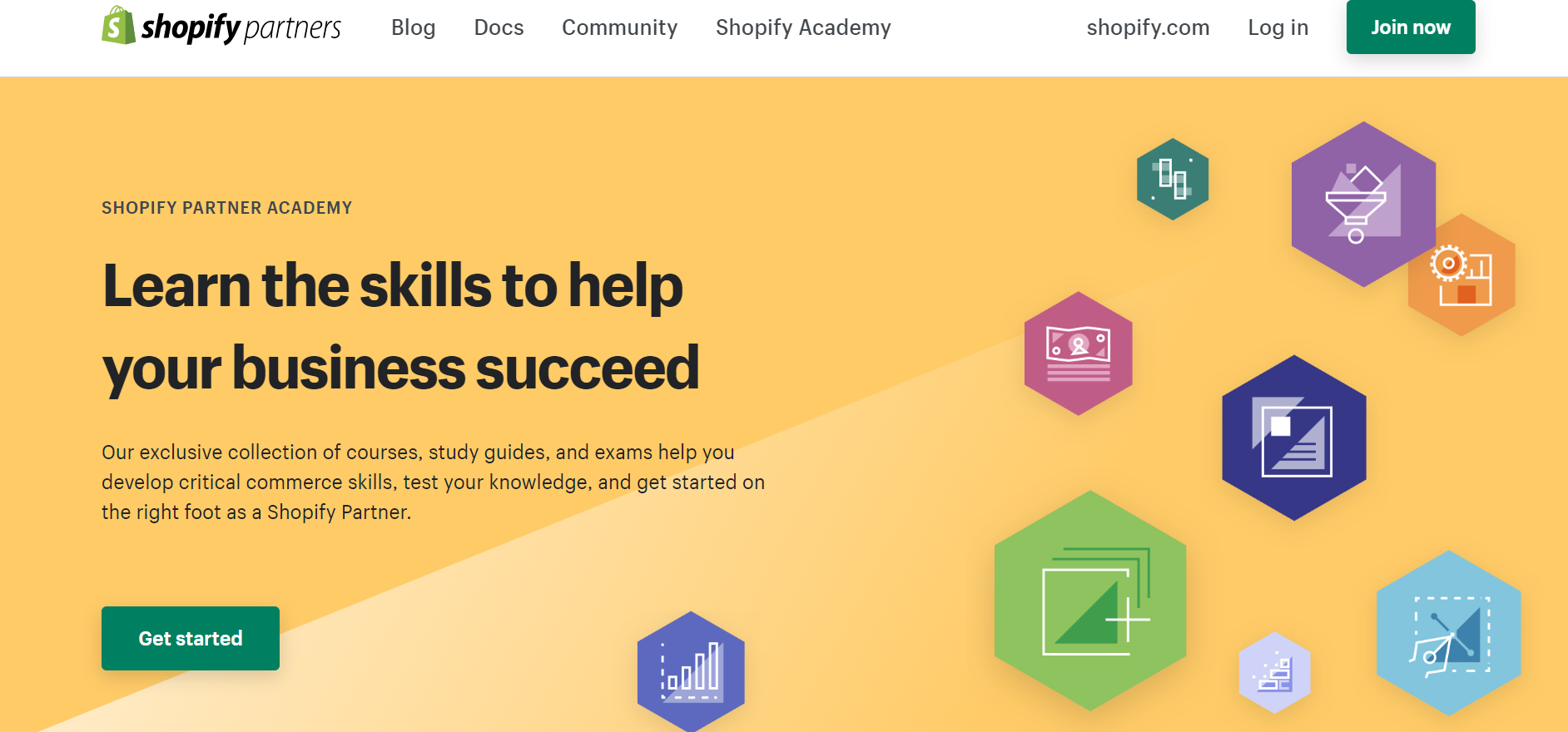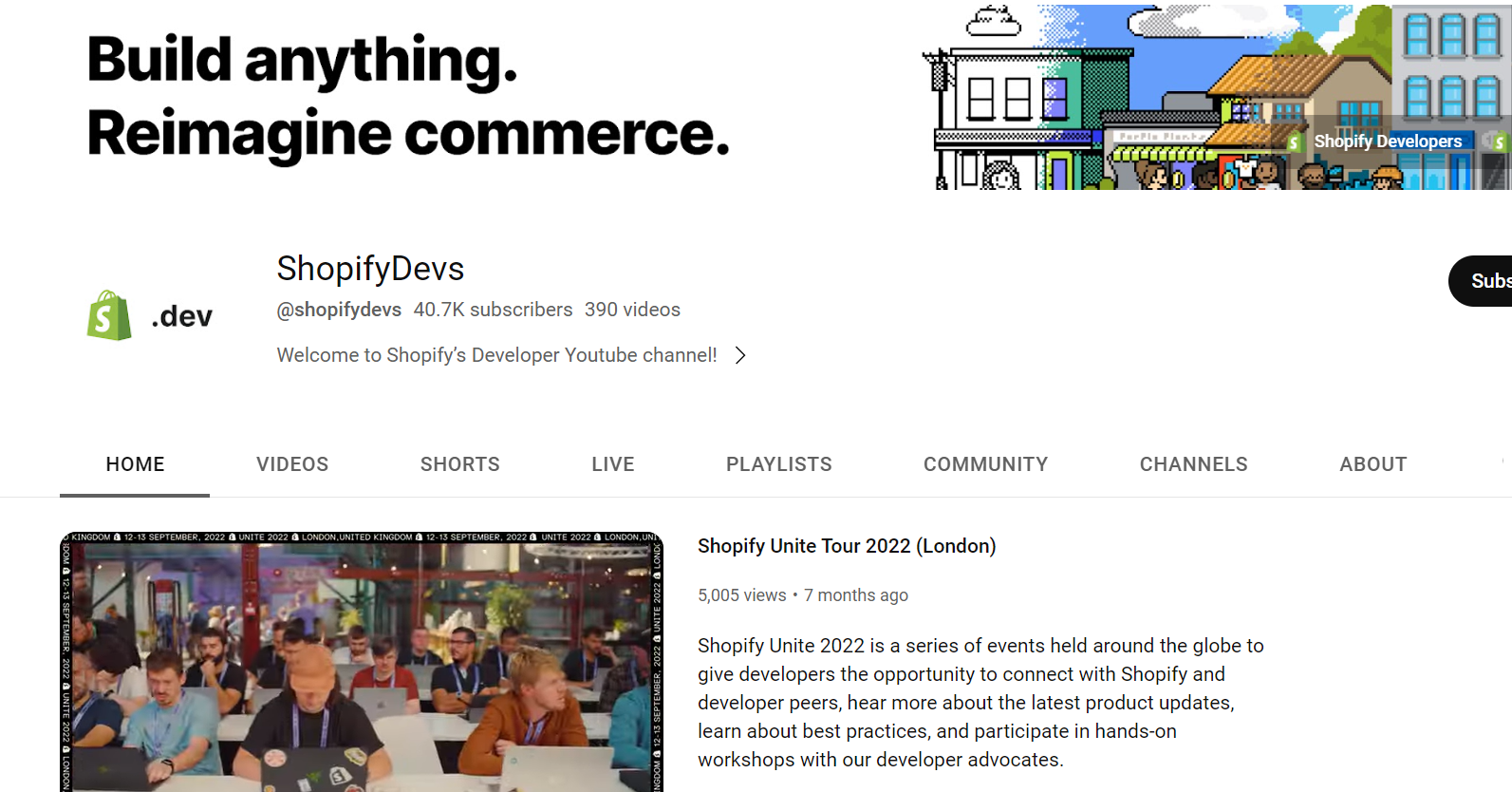If you are intrigued by the prospect of crafting immersive digital storefronts, optimizing user experiences, and diving into the world of e-commerce development, then becoming a Shopify developer might be the perfect path for you. Whether you’re an aspiring developer or an experienced professional seeking to expand your skill set, this comprehensive guide will take you through the essential steps and skills needed to become a successful Shopify developer.
Throughout this article, we will delve into the core components of the Shopify ecosystem, explore the development process, and discuss the key skills required to excel in this field. We’ll also provide valuable insights, tips, and resources to help you embark on your journey toward becoming a proficient Shopify developer.
Who are Shopify developers?
Shopify developers are knowledgeable experts who focus on building, personalising, and sustaining online stores using the Shopify platform. They possess a deep understanding of Shopify’s features, themes, and APIs, enabling them to build engaging and functional e-commerce websites tailored to their client’s unique needs.
These developers are responsible for transforming design concepts and business requirements into fully functional Shopify stores. They work with Shopify’s templating language, Liquid, to build and modify themes, implement custom features and functionalities, and optimize the overall performance of the online stores.
Shopify developers may also be involved in integrating third-party applications, payment gateways, and other software solutions to enhance the functionality and user experience of online stores. They are proficient in HTML, CSS, JavaScript, and other relevant programming languages, allowing them to customize and extend the capabilities of Shopify beyond its out-of-the-box features.
Furthermore, Shopify developers stay updated with the latest trends, best practices, and updates in the e-commerce industry to ensure that the online stores they build are secure, scalable, and optimized for conversions. They may collaborate with designers, project managers, and business owners to bring their vision to life and deliver exceptional online shopping experiences.
How To Become A Shopify Developer Successfully

Becoming a successful Shopify developer requires dedication, learning, and practical experience. Here are some steps and considerations to help you on your path to becoming a proficient Shopify developer:
- Understand the Basics: Start by familiarizing yourself with the fundamentals of web development, including HTML, CSS, and JavaScript. These languages form the building blocks of Shopify development and will provide a strong foundation for your journey.
- Learn Liquid: Shopify uses its own templating language called Liquid. Invest time in understanding how Liquid works, as it will be essential for customizing themes, creating dynamic content, and implementing advanced functionalities.
- Explore Shopify’s Documentation: Shopify provides comprehensive documentation that covers various aspects of development, including theme customization, app development, and API integration. Spend time studying the documentation to gain insights into the platform’s capabilities and best practices.
- Build and Customize Themes: Practice building and customizing Shopify themes to gain hands-on experience. Start with pre-existing themes and modify them to meet specific requirements.
- Explore App Development: Expand your skill set by learning Shopify app development. Explore the Shopify App Store, analyze existing apps, and understand the process of developing and publishing your own apps. This will provide you with additional avenues to contribute to the Shopify ecosystem.
- Stay Updated: The e-commerce industry is constantly evolving, and Shopify regularly introduces updates and new features.
Which Skills Are Necessary for a Shopify Developer?
To excel as a Shopify developer, there are 4 key skills that are necessary for success.
1. Critical thinking
In order to generate sound judgements or make wise decisions, critical thinking requires actively and objectively analysing, evaluating, and understanding data or situations. It is a valuable skill for problem-solving, decision-making, and effective communication in various fields, including as a Shopify developer. Here are some key aspects of critical thinking:
- Analytical Thinking: Critical thinking involves breaking down complex problems or situations into smaller components to understand their underlying elements and relationships. It requires the ability to examine information, identify patterns, and discern relevant details while filtering out irrelevant or misleading factors.
- Logical Reasoning: Critical thinking relies on logical reasoning to evaluate arguments, assess the validity of statements, and draw sound conclusions. It involves recognizing logical fallacies, identifying gaps in reasoning, and formulating well-supported judgments based on evidence and logic.
- Problem-Solving: Critical thinking plays a vital role in problem-solving by enabling you to approach challenges systematically and creatively.
- Reflection and Self-awareness: Critical thinking involves deliberating on one’s own thought procedures, prepossessions, and assumptions. By being mindful of these biases, critical thinkers can strive for more objective analysis.
- Effective Decision-making: Critical thinking helps in making informed decisions by carefully considering available information, evaluating alternatives, and anticipating potential consequences. It involves weighing the risks and benefits, considering long-term implications, and selecting the option that aligns with the desired goals.
2. Coding skills

Coding skills refer to the ability to write, understand, and manipulate programming code to create software applications, websites, or other digital solutions. As a Shopify developer, having strong coding skills is essential for customizing themes, implementing features, and extending the functionality of Shopify stores. Here are some important aspects of coding skills:
- Programming Languages: Proficiency in relevant programming languages is fundamental for a Shopify developer. This typically includes HTML, CSS, JavaScript, and Shopify’s templating language, Liquid. HTML is used for structuring the content and elements of web pages, CSS is employed for styling and layout, JavaScript adds interactivity and dynamic behaviour, and Liquid enables customization of Shopify themes.
- Understanding Syntax and Logic: Understanding the syntax and organisation of programming languages is a must for good coding skills. It is important to learn how to write clean, well-organized code that follows best practices. This includes proper indentation, using meaningful variable names, and adhering to established coding conventions. Additionally, understanding logical constructs, such as loops and conditional statements, allows you to control program flow and implement complex functionality.
- Version Control: Knowledge of version control tools like Git is essential for tracking code changes and collaborating on projects. Understanding how to create branches, track modifications, merge code, and resolve conflicts facilitates efficient teamwork and ensures code stability.
- APIs and Integrations: As a Shopify developer, you may need to work with external APIs and integrate third-party services into the online stores. This requires understanding how to interact with APIs, make API requests, and handle responses. Familiarity with concepts such as RESTful APIs, OAuth authentication, and data serialization formats like JSON is valuable for seamless integrations.
3. Integrating skills
Integrating skills refer to the ability to connect different systems, applications, or services together to create seamless and cohesive digital experiences. As a Shopify developer, having strong integrating skills is important for enhancing the functionality and user experience of Shopify stores. Here are several key elements of integrating skills:
- Understanding APIs: Application Programming Interfaces (APIs) enable data sharing and communication between various software systems. Developing integrating skills involves understanding how APIs work, learning their specifications and documentation, and knowing how to interact with them. This includes making API requests, handling responses, and parsing data in the appropriate format (e.g., JSON or XML).
- Third-Party App Integration: Shopify offers a wide range of third-party apps that can extend the features and capabilities of online stores. Integrating these apps requires understanding their APIs, configuration options, and how to incorporate them seamlessly into the Shopify environment.
- Custom Integrations: In addition to third-party apps, Shopify developers may need to create custom integrations to meet specific client requirements. This could involve integrating external systems, databases, or services with the Shopify store.
- Data Migration: When migrating from another e-commerce platform to Shopify, or when transferring data between different systems, integrating skills come into play.
- Error Handling and Troubleshooting: This could include debugging errors, handling authentication or authorization problems, or troubleshooting connectivity or data synchronization issues. Effective problem-solving and troubleshooting skills are essential for ensuring seamless integrations.
4. Communication skills

Communication skills are vital for a Shopify developer to effectively collaborate with clients, designers, project managers, and other team members. Strong communication skills facilitate a clear understanding of project requirements, efficient problem-solving, and seamless coordination. Here are a few crucial communication skills components:
- Listening and Understanding: Effective communication begins with active listening. It involves paying attention to the perspectives and requirements of others and seeking clarification when needed. By understanding the goals and expectations of stakeholders, a Shopify developer can ensure that the end product aligns with their vision.
- Clear and Concise Expression: Communication skills involve expressing ideas, thoughts, and technical concepts clearly and concisely. This includes using appropriate vocabulary, avoiding jargon or technical terms when communicating with non-technical stakeholders, and organizing information in a logical manner.
- Written Communication: Shopify developers often need to document code, write project specifications, or provide updates on their progress. Strong written communication skills are important for conveying information accurately and comprehensively. This includes writing clear, well-structured code comments, creating detailed documentation, and effectively communicating through email or project management tools.
- Collaboration and Teamwork: Communication skills are essential for effective collaboration within a development team. This involves actively participating in discussions, providing constructive feedback, and sharing ideas and insights.
- Active Feedback and Continuous Improvement: Effective communication involves giving and receiving feedback openly and constructively. Shopify developers should provide feedback on design concepts, code reviews, and project workflows.
Best resources for Shopify developers
1. Shopify Partner Academy & Shopify Partner Blog

The Shopify Partner Academy and Shopify Partner Blog are two valuable resources provided by Shopify specifically tailored for Shopify developers and partners. Here’s more information about each of them:
The Shopify Partner Academy is an online learning platform that offers a range of courses and certifications to help developers, designers, and marketers build their expertise and skills in Shopify development. The academy provides structured, self-paced courses that cover various topics related to Shopify, including:
- Theme Development: Learn how to create custom themes, modify existing themes, and optimize the design and user experience of Shopify stores.
- App Development: Gain insights into building Shopify apps, integrating third-party services, and leveraging APIs to extend the functionality of Shopify stores.
- Marketing Strategies: Explore marketing techniques and strategies specifically tailored for Shopify, including SEO, email marketing, and social media advertising.
The Shopify Partner Blog is a valuable resource for Shopify developers, designers, and partners to stay updated with the latest news, announcements, and insights from Shopify. The blog covers a wide range of topics relevant to Shopify, including:
- Development Tips and Tricks: Discover coding techniques, best practices, and tutorials to enhance your Shopify development skills. Learn about new features and APIs that can be leveraged to create innovative solutions.
- Design and UX: Gain insights into designing visually appealing and user-friendly Shopify stores. Learn about design trends, optimization techniques, and strategies to enhance the customer experience.
- Marketing and Business: Explore marketing strategies, conversion optimization techniques, and business insights to help you succeed as a Shopify partner. Stay informed about industry trends and emerging opportunities.
2. Shopify’s official Shopify Dev YouTube Channel or Shopify Dev Twitch Channel
Shopify’s official Shopify Dev YouTube Channel and Shopify Dev Twitch Channel are popular platforms that provide video content and live streams dedicated to Shopify development. Here’s more information about each of them:

The Shopify Dev YouTube Channel is a hub for Shopify developers, designers, and partners to access a wide range of video content related to Shopify development. The channel offers a variety of video formats, including tutorials, coding tips, live coding sessions, feature updates, and interviews with Shopify experts. Here’s what you can expect from the YouTube channel:
- Tutorials and Guides: The YouTube channel features step-by-step tutorials and guides that cover various aspects of Shopify development. These videos provide hands-on demonstrations and explanations to help you learn and master different techniques and features.
- Live Coding Sessions: The channel occasionally hosts live coding sessions where Shopify experts build applications, themes, or customizations in real-time. These sessions allow you to observe the development process, learn best practices, and ask questions during the live chat.
- Feature Updates and Announcements: Shopify frequently releases updates and new features. The YouTube channel keeps you informed about these updates, showcasing the latest enhancements, APIs, and functionalities available for developers.
The Shopify Dev Twitch Channel is a live streaming platform where Shopify developers and partners can engage with Shopify experts in real time. Here’s what you can expect from the Twitch channel:
- Live Coding and Q&A Sessions: The Twitch channel hosts live coding sessions where Shopify developers demonstrate coding techniques, build applications, or customize Shopify themes.
- Community Interaction: The Twitch channel fosters a sense of community among Shopify developers and partners.
- Collaboration and Networking: The Twitch channel occasionally features guest developers, industry experts, and Shopify employees. This provides opportunities for collaboration, networking, and gaining insights from experienced professionals in the Shopify ecosystem.
3. Other resources
There are numerous other online resources that can aid in your Shopify development journey. Some notable ones include:
- Shopify Developers Documentation: Shopify’s official documentation provides comprehensive guides, references, and API documentation that cover all aspects of Shopify development.
- GitHub Repositories: GitHub hosts a vast collection of open-source Shopify projects, themes, and libraries. Investigating and adding to these sources might offer insightful information and cooperative opportunities.
- Shopify App Store: The Shopify App Store showcases a wide range of apps and plugins built by developers. Exploring these apps can give you inspiration, insights into best practices, and an understanding of what is possible with Shopify.
- Online Learning Platforms: Platforms like Udemy, Coursera, and LinkedIn Learning offer Shopify development courses and tutorials created by industry experts. These classes offer organised instruction and practical activities to help you improve your skills.
Bottom Line
In conclusion, becoming a successful Shopify developer requires a combination of technical skills, critical thinking abilities, and effective communication. By mastering these skills, you can unlock a world of opportunities to create powerful and customized e-commerce experiences for clients using the Shopify platform.
To further enhance your skills, there are valuable resources available, such as the Shopify Partner Academy, Shopify Partner Blog, Shopify Dev YouTube Channel, and Shopify Dev Twitch Channel. These platforms offer courses, certifications, tutorials, and interactive sessions that provide ongoing learning and keep you updated with the latest trends and developments in the Shopify ecosystem.
In your journey to becoming a Shopify developer, remember to continuously learn, practice, and stay curious. Embrace challenges as opportunities for growth, engage with the vibrant Shopify community, and strive for excellence in your craft. With dedication and a passion for creating exceptional e-commerce experiences, you can thrive in the world of Shopify development and unlock a rewarding career.

